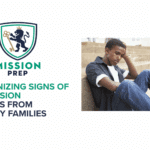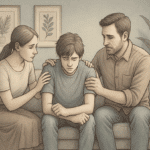Family Issues Causing Teen Depression:
How Family Problems Can Lead to Depression in Teenagers


A teenager’s life is like a tower of building blocks. Each block represents different important areas of their life, such as family, friends, school, and health. When all of these areas are operating smoothly, the tower feels stable and secure. However, when one of the blocks becomes unstable, the whole tower can feel like it’s about to fall.
To put it another way, a major change in one area of a teenager’s life can have a knock-on effect on all the others – potentially contributing to the risk of depression.
If you’re concerned that family issues or major life events are putting a teen at risk of developing depression, support and advice are available to you. This article can help raise awareness of how family issues and life events can lead to teen depression by discussing:
- The family problems that can lead to teen depression
- The impact of divorce on adolescent mental health
- How to cope with family issues and teen depression
- Therapy options for family issues in depressed teens
- When to seek help for family issues and teen depression

Key Takeaways
- Family problems like conflict, financial stress, and health issues can contribute to teen depression.
- Major changes in the home environment may affect teens’ emotional well‑being and increase depression risk.
- Supportive family communication and cohesion can reduce depression symptoms.
- Teens in homes with ongoing conflict or poor functioning are more likely to experience mood disturbances.
- Mission Prep provides targeted care that helps teens and families navigate stressors and improve mental health outcomes.
Table of Contents
Family Issues Causing Teen Depression
Family problems which can lead to teen depression include conflict, financial issues, and health problems. Some teens don’t struggle with mental health issues as a result of these issues – but many do. For this reason, it’s important to understand how family problems can cause teen depression.
Family-related causes of depression in adolescents include:
Health Issues
Either having a medical illness of their own or witnessing it in someone they care about could lead to symptoms of depression in a teen. A teen may feel like illness is constantly on their mind, affecting how they sleep, eat, concentrate, and spend time with friends. For instance, studies have shown that having a parent with an illness such as cancer can make a teen feel constantly worried and distressed. They may feel scared and unable to turn to their usual support systems, such as family and friends, for advice and comfort.1,2
Financial Problems
A parent losing a job or experiencing debt can lead to the symptoms of depression in teens. When there are worries about money in a family, levels of conflict tend to rise, as can stress about bills and the cost of living. Plus, many teenagers struggled with parental job loss and financial problems during the COVID-19 pandemic, which may still be impacting their mental health.3
Death of a Family Member
Changes to the Family’s “Emotional Climate”
Although each of these family issues could increase the risk of depression, one of the most recognized issues that can lead to depression in teens is divorce.
Divorce Impact on Adolescent Mental Health
Divorce can hurt everyone involved. Unfortunately, divorce can cause frequent conflict, such as over division of assets, custody agreements, infidelity, finances, and so on. What’s more, children and teenagers are often stuck in the middle of these conflicts, acting as an ill-equipped mediator between two people they love.
As a result of such conflict and upheaval, studies have shown that teenagers who experience divorce are more likely to develop signs of depression. What’s more, without effective treatment, the effects of depression resulting from divorce have been shown to extend into adulthood.6,7
According to these studies, the common symptoms of depression associated with divorce include:
Persistent sadness and hopelessness
- Fears of socializing
- Withdrawal from others
- Difficulties concentration
- Poor performance at school
The most recent statistics on marriage and divorce in the U.S. show that almost half of marriages end up in divorce – and a high percentage of these marriages include children. Based on how studies show that teens who witness divorce are more likely to experience depression, professional mental health support during such times of upheaval may be necessary.8
It’s good to be aware that not all teenagers whose parents separate or divorce develop depression. Other factors such as temperament, sensitivity to negative emotions, and ability to handle stress may increase a teen’s risk of depression during divorce. However, if you’re concerned about the impact of divorce on a teen’s mental health, professional advice and support are available.

Other Major Life Events Affecting Teen Mental Health
Family issues and divorce aren’t the only events that can increase the risk of depression in a teen. Adolescence is a time of transition, so it’s natural for teens to encounter challenging or stressful situations. However, if a teen doesn’t understand their emotions and how to cope with them in healthy ways, events such as the following could affect their mental health.
Grief
Grief is what we feel when we’re trying to cope with loss. According to the American Psychological Association (APA), grief can include physical distress, separation anxiety, confusion, and fear of the future. What’s more, intense grief can affect the immune system, cause us to neglect self-care, and even lead to thoughts about death. Each of these issues can be a symptom of depression. These issues may also impact a teen’s life in a variety of ways, affecting their ability to concentrate, school performance, relationships, and outlook on the world.9,10
A teen might not only experience grief in response to the death of a loved one. They might struggle with any loss of an important connection or experience that shakes their sense of normalcy. For instance, aside from the death of a loved one, a teen might grieve:
The loss of a friendship
- The death of a beloved family pet
- A lack of stability at home
- The loss of a goal or dream
Moving Area
Graduating From High School
Graduation is an important milestone in a teen’s life; it can feel like the transition from childhood into adulthood. However, many teens find this transition difficult. They may miss the people they were surrounded by every day and the comfort of a familiar environment. Feeling this way could lead to ongoing sadness and symptoms of depression.
What’s more, this effect might have been even more profound for teens who graduated during the COVID-19 pandemic, as studies show that teens who left school during this time reported higher depression levels.12
Coping With Family Issues and Teen Depression
Problems in the family dynamic can be difficult to cope with and can have long-lasting effects on a teen’s mental and physical health. If you’re worried about the signs of depression in yourself or someone else, the best step you can take is to contact a mental health professional for advice and support.
There are also steps you can take in the here and now to protect teen mental health, including:
Check In With Them
No matter what the family issue is, it’s important to check in with a teen and have an open conversation about their mental health. It’s understandable to feel distracted when there are problems in the family environment, but a teen may be bottling up their feelings – and may even be blaming themselves. Choose a suitable time, free of distraction, to ask them how they’re doing. Also, sharing how you’re coping could model healthy, open conversations about mental health – you don’t have to share unnecessary details.
Maintain as Much Normalcy as Possible
Teenagers need boundaries and routine – these can create a sense of emotional safety for them. Aim to maintain their usual routine as much as possible, so even though there may be stress and challenges, they will at least know their environment is reliable and secure.
Avoid Sweeping Generalizations
If you’re separating from or divorcing a spouse – or experiencing conflict with a partner – it’s important not to speak about them in “black and white” or negative ways to a teen. Yes, you may be frustrated and hurt, but this person is also a teen’s parent. Confusing them about their relationship with this person can damage their mental health and feeling of safety. If you feel anger start to rise, instead of impulsively reacting, take a moment and choose a way to respond that aligns with your values.
Take Care of Yourself
It can be very difficult to look after a teen’s emotional needs if you’re not tending to your own. Family issues such as conflict, loss, financial issues, and divorce may also take a toll on your mental health. A teen may be sensitive to a change in your well-being, which can lead to anxiety and depression for them.
Make sure you’re taking the time to relax, eat a balanced diet, spend time with loved ones, and sleep. There are also mental health professionals who can help you recognize and take care of your own needs.
Ask Them if Professional Support Could Help
If a teen expresses that they’re finding family issues or major life events challenging to cope with, you could gently ask whether talking to a mental health professional could help. If they’re receptive to this, you could offer to assist them in finding someone they think might be able to help.
Therapy Options for Family Issues in Depressed Teens
Family issues such as divorce and major life events can cause emotional distress, self-esteem and identity issues, behavioral changes, and lower academic performance in a teen. All of these issues could be a sign of depression.
If you’re concerned about the symptoms of depression in a teen, they can be very difficult to cope with alone – and you don’t have to. A mental health professional can recommend a suitable course of treatment and therapy for whatever issues a teen is going through. They will likely discuss the following effective therapy options with you:
CBT can help teens experiencing family issues and life changes identify their negative thoughts, how to challenge these, and build healthy ways of coping with stress.
Family-Based Interpersonal Therapy
Interpersonal therapy can help teens and their families work through problems with communication and boundaries to figure out how to manage conflict for better mental health.
EMDR can help a teen process traumatic experiences in a safe, supportive environment – changing how trauma is stored in the brain. EMDR can also help a teen build positive self-beliefs and cope better with challenges.
TMS can be effective in treating treatment-resistant depression. It’s a non-invasive treatment that uses magnetic fields to activate nerve cells in targeted areas of the brain – improving outlook and mood.
Group Therapy
Group therapy can help a teen understand that the issues they’re experiencing are also common problems for other people their age. Expressing how they feel and receiving validation can help them feel supported – and can also expand their social group.
Each of these therapies can be offered as a part of a residential mental health treatment program or outpatient program, depending on a teen’s unique needs.

When to Seek Help for Family Issues and Teen Depression
If you’re concerned that family issues are contributing to depression in a teen, it’s important to seek support as soon as possible. A teen may blame themselves for problems at home, contributing to low self-esteem, feelings of hopelessness, and a lack of motivation. The longer issues such as these persist, the more they can damage their mental and physical health and prospects for the future.
Mission Prep’s team of trained professionals understand the impact that family issues can have on teen mental health. We offer depression treatment programs in various locations, supporting teenagers in seeing that they are not to blame and that they have a bright and hopeful future ahead. Contact us today for support and advice.
References
- Alexander, E. S., & B Halkett, G. K. (2023). The Psychosocial Effect of Parental Cancer: Qualitative Interviews with Patients’ Dependent Children. Children, 10(1), 171. https://doi.org/10.3390/children10010171
- National Cancer Institute. (n.d.). Support for teens when a family member has cancer. National Institutes of Health. Retrieved [Feb 26th], from https://www.cancer.gov/about-cancer/coping/caregiver-support/teens
- Argabright, S. T., Tran, K. T., Visoki, E., DiDomenico, G. E., Moore, T. M., & Barzilay, R. (2022). COVID-19-related financial strain and adolescent mental health. Lancet Regional Health – Americas, 16, 100391. https://doi.org/10.1016/j.lana.2022.100391
- National Research Council (US) & Institute of Medicine (US) Committee on Integrating the Science of Early Childhood Development. (2000). From neurons to neighborhoods: The science of early childhood development. National Academies Press (US). Retrieved from https://www.ncbi.nlm.nih.gov/books/NBK217849/
- Sander, J. B., & McCarty, C. A. (2005). Youth Depression in the Family Context: Familial Risk Factors and Models of Treatment. Clinical Child and Family Psychology Review, 8(3), 203. https://doi.org/10.1007/s10567-005-6666-3
- Obeid, S., Karaki, G. A., Haddad, C., Sacre, H., Soufia, M., Hallit, R., Salameh, P., & Hallit, S. (2021). Association between parental divorce and mental health outcomes among Lebanese adolescents: Results of a national study. BMC Pediatrics, 21, 455. https://doi.org/10.1186/s12887-021-02926-3
- Bohman, H., Låftman, S. B., Päären, A., & Jonsson, U. (2017). Parental separation in childhood as a risk factor for depression in adulthood: A community-based study of adolescents screened for depression and followed up after 15 years. BMC Psychiatry, 17, 117. https://doi.org/10.1186/s12888-017-1252-z
- Centers for Disease Control and Prevention. (n.d.). Marriage and divorce. National Center for Health Statistics. Retrieved February 26, 2025, from https://www.cdc.gov/nchs/fastats/marriage-divorce.htm
- Osterweis, M., Solomon, F., & Green, M. (Eds.). (1984). Bereavement: Reactions, consequences, and care. National Academies Press. https://www.ncbi.nlm.nih.gov/books/NBK217849/
- American Psychological Association. (n.d.). Grief. In APA Dictionary of Psychology. Retrieved [date], from https://dictionary.apa.org/grief
- Sabel, C. E., Pedersen, C. B., Antonsen, S., Webb, R. T., & Horsdal, H. T. (2024). Changing neighborhood income deprivation over time, moving in childhood, and adult risk of depression. JAMA Psychiatry, 81(9), 919–927. https://doi.org/10.1001/jamapsychiatry.2024.1382
- Yang, N., & Yang, X. (2022). Anxiety and depression in graduating university students during the COVID-19 pandemic: A longitudinal study. American Journal of Translational Research, 14(4), 2668. https://pmc.ncbi.nlm.nih.gov/articles/PMC9091131/
Family Issues & Teen Depression FAQs
Teen depression can be triggered or worsened by family conflict, financial worries, parental illness, or major life changes that disrupt a teen’s sense of stability and security.
Strong, supportive communication within the family can help reduce stress and lower the risk of depression, while ongoing conflict and poor cohesion are linked to higher depressive symptoms.
Depression can strain family dynamics, leading to frustration, withdrawal, and increased tension between teens and parents or siblings.
Mission Prep offers structured therapeutic support that helps teens build healthy coping skills and assists families in improving communication and understanding to better support recovery.
If teen mood changes are persistent, interfere with daily life, school, or relationships, it’s important to seek help from a mental health professional or specialized program to address both individual and family factors.


- How Parents Can Help Teens With Depression
- Family Support for Teen Depression
- Understanding Teen Depression
- Does Teen Depression Go Away?
- How Daily Stressors Impact Teen Depression
- Healthy Ways to Cope With Teen Depression
- How to Talk to Parents About Depression
- Sadness vs. Depression: When to Seek Help
- Coping Strategies for Seasonal Affective Disorder



















